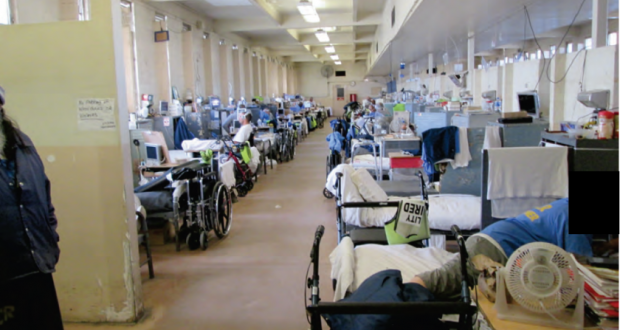California reports the state’s first COVID-19 prisoner death; officials remain slow to act as the coronavirus threatens to ravage California’s incarcerated population
CALIFORNIA, U.S.—- Families of incarcerated people and criminal justice advocates condemned the failure of state officials to act urgently in order to protect people in prisons, one of the populations most vulnerable to severe illness and death caused by the coronavirus. On Sunday, the California Department of Corrections and Rehabilitation (CDCR) reported its first COVID-19 related death of an incarcerated person in custody.
“We know what’s going to happen,” said Cyrus Dunham, an organizer with California Coalition for Women Prisoners. “In Michigan, someone weeks away from being released from prison contracted the virus and died. One day ago, 73% of people incarcerated in an Ohio state prison tested positive for COVID-19. We only have to look at the news reports from other states. This is not a surprise. This is an emergency. Gov. Newsom has two options: prevent more tragedy now, or regret it later.”
Community members and families of incarcerated people across the country have been demanding mass clemencies for more than three weeks in response to the pandemic. The media campaigns––#ClemencyCoast2Coast and #LetThemGo––trended on Twitter with tens of thousands of posts and shares, all demanding that state Governors use their vast executive power to release people from prisons, returning older and medically vulnerable people who carry the greatest risk of death from COVID-19 back to their communities.
Taking the lead from community members and advocates, recognizable names from the entertainment industries quickly embraced the movement on social media, including Orange Is the New Black author Piper Kerman, Academy Award Winner Joaqin Phoenix, musicians Kim Gordon, The Tune-Yards and actor Vella Lovell.
As of April 21st, at 5:40pm, 122 incarcerated people in CDCR custody and 89 staff members had tested positive for COVID-19. The number of reported positive cases of coronavirus is rising daily. Multiple sources report at least two COVID-19 prisoner deaths at California Federal Prisons, and that COVID-19 safety precautions are being inconsistently applied at all institutions.
State prisons remain overcrowded, operating at approximately 129% capacity. Gov. Newsom recently expedited the release of 3,500 people charged with non-violent offenses who were already found suitable for parole. Advocates say the biggest obstacle to mass clemency efforts, which have historical precedent, has been Gov. Newsom’s reluctance to consider people for release who have been convicted of violent offenses as a direct response to the coronavirus. Academics, criminal justice experts and community organizers maintain that if Gov. Newsom fails to consider people convicted of serious offenses for release, enough lives will not be saved.
“There was already a crisis of care in California prisons,” said Brian Kaneda, Los Angeles Coordinator for Californians United for a Responsible Budget (CURB), a coalition of more than 80 organizations dedicated to reducing the number of people in prisons and jails across the state. CURB has co-led demands that Governor Newsom release at least 50,000 aging and medically vulnerable people from prison––or around 40% of the total CDCR prison population––during the first stage of mass clemencies.
“Mass clemencies are a critical public health intervention that will save the lives of incarcerated people, prison staff, and their communities. Our recommendations are evidence-based. More deaths are coming,” said Mr. Kaneda. “The state has a legal and moral responsibility to protect people in its custody. Gov. Newsom has the power to save a lot of lives and show that he intends to be the Governor for all Californians during this unprecedented time.”
 Westside Story Newspaper – Online The News of The Empire – Sharing the Quest for Excellence
Westside Story Newspaper – Online The News of The Empire – Sharing the Quest for Excellence



